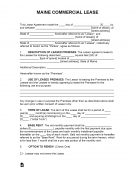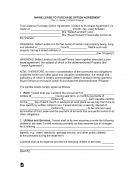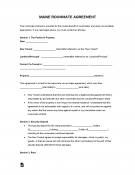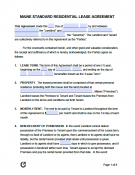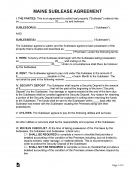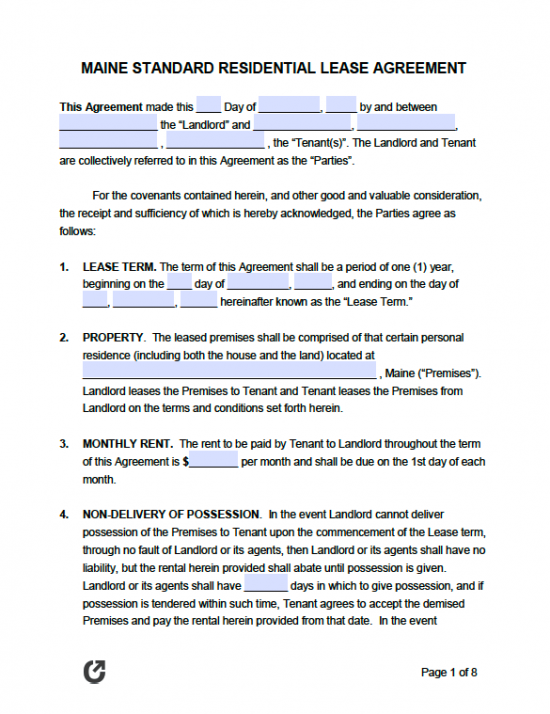Maine lease agreements are contracts that govern a tenant’s lease of a landlord’s property. The agreements must be in writing, and will cover the essentials of a lease like the monthly rent and responsibility for utilities. It’s also an opportunity to spell out the duties of both the landlord and the tenant, which can make it easier to avoid disputes during a tenancy.
Contents
- Maine Lease Agreements: By Type (6)
- Landlord-Tenant Laws
- Handbooks and Guides
By Type (6)
- Commercial Lease Agreement
- Month-to-Month Lease Agreement
- Rent-to-Own Lease Agreement
- Roommate Lease Agreement
- Standard Lease Agreement
- Sublease Agreement
Download: Adobe PDF, MS Word, Rich Text Format
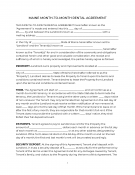 Month-to-Month Lease Agreement
Month-to-Month Lease Agreement
Download: Adobe PDF, MS Word, Rich Text Format
Download: Adobe PDF, MS Word, Rich Text Format
Download: Adobe PDF, MS Word, Rich Text Format
Download: Adobe PDF, MS Word, Rich Text Format
Download: Adobe PDF, MS Word, Rich Text Format
Landlord-Tenant Laws
Statutes – Title 40, Chapter 709, Subchapter 1 (Residential Landlords and Tenants)
Required Disclosures (8)
Bedbugs Infestation Disclosure – If the dwelling unit or an adjacent property is being treated or currently has bedbugs, this information must be disclosed to the tenant in writing. Landlords should also provide this Fact Sheet published by the Maine State Housing Authority (§ 6021-A).
Electricity to Common Areas – A landlord may not bill a tenant for electricity, heat, or any utility or service provided in “common areas” of a property, such as hallways and stairwells of an apartment complex, unless the tenant agrees (§ 6024).
Energy Efficiency Disclosure – This form will identify the energy efficiency of systems and areas of the home. It must be completed by the landlord and signed by the tenant.
Lead-Based Paint Disclosure – Under federal law, all tenants that will be living in rental units built before 1978 must be warned about the risks of lead paint.
Radon Disclosure Form (pamphlet included) – Landlords are required to check a property for the presence of radon every ten (10) years. This form must be issued to every tenant, alerting them to the possible presence of radon, a known carcinogen (§ 6030-D).
Rental Housing Rights Disclosure Form (Portland, Maine ONLY) – Landlords of properties located in the city of Portland must provide this document before the tenant begins occupying the property.
Security Deposit Location – A landlord must provide the name of the bank and the account number where a tenant’s security deposit is being stored (§ 6038).
Smoking Policy – Landlords must make explicit the policy on smoking for the dwelling unit, including whether it is only allowed in certain areas, or prohibited outright (§ 6030-E).
Security Deposit Laws
Maximum Amount ($)
A landlord may charge no more than two (2) months’ rent as a security deposit (§ 6032).
Returning to Tenant
A landlord must return a tenant’s security deposit within thirty (30) days of the termination of the tenancy. The landlord may return a portion of the security deposit for reasons including owed payment of rent or repairs of damage that occurred during the tenancy. Security deposits may not be used to address the impacts of normal wear-and-tear. If the landlord plans to retain a portion of the security deposit, then the landlord must include, along with any remaining money owed to the tenant, a written itemization of the reason or reasons for retaining the amount. Failure to provide the deposit or itemization within thirty (30) days means that the landlord is deemed to have forfeited the right to retain any of the deposit, while the landlord’s obligation may be completed by sending the money and writing, if required, to the tenant’s last known address. (§ 6033)
When is Rent Due? (grace period)
Landlords and tenants may decide on the time and place to provide rent. Rent is not considered “late” for the purpose of imposing a fee until fifteen (15) days after it is due. See the section immediately below for information on the relationship between late rent and evictions (§6028).
Eviction Notice (non-payment)
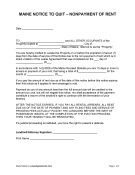 7-Day Notice to Pay or Quit – If a tenant does not pay rent within seven (7) days of the date that it is due, the landlord or an agent may post this notice on the dwelling unit, informing the tenant that if the owed amount is not provided within seven (7) additional days, the landlord may initiate eviction procedures. This form contains language that is required by law to be included in a notice to quit (§6002).
7-Day Notice to Pay or Quit – If a tenant does not pay rent within seven (7) days of the date that it is due, the landlord or an agent may post this notice on the dwelling unit, informing the tenant that if the owed amount is not provided within seven (7) additional days, the landlord may initiate eviction procedures. This form contains language that is required by law to be included in a notice to quit (§6002).
Download: Adobe PDF
Maximum Fees ($)
Late Rent Penalties
For rent that has been turned in more than fifteen (15) days after the agreed on due date, a landlord may assess a penalty of no more than four percent (4%) of the monthly rent (§6028).
NSF Checks
Maine law allows the charging of fees for offering checks with insufficient funds, but does not set a maximum. The state Bureau of Financial Institutions, not specifically addressing landlord-tenant situations, suggests that $10 to $25 is a typical amount.
Tenant’s Unclaimed Property
If a landlord encounters a tenant’s personal property in a dwelling unit after the termination of a lease, the landlord must put the property in a storage location that is safe, dry and secure. The landlord must notify the tenant in writing about discovering the personal property, instructing the tenant to respond within seven (7) days of the mailing of the notice, and informing the tenant that the property may be disposed of in the manner described in the last sentence of this paragraph if the tenant does not respond. If the tenant notifies the landlord of intent to claim this property within seven (7) days of the mailing of the notice, and does in fact arrive to claim it within fourteen (14) days, the landlord must surrender it and may not charge a fee for storage, or demand any money owed by the tenant in return for the personal property’s release. (Whether or not the tenant arrives, if the tenant submits a notice of intent to reclaim the property, the landlord must refrain from disposing of it for at least an additional fourteen (14) days.) If the tenant does not respond in time, the landlord may do one of three (3) things:
- Continue to store the property, and condition its release to the tenant in the future upon the tenant paying any owed money, plus the storage costs;
- publicly sell the property, use the proceeds to settle any of the tenant’s debts to the landlord, and send any remainder to the state treasurer; or,
- for property without any apparent value, dispose of it (§6013).
